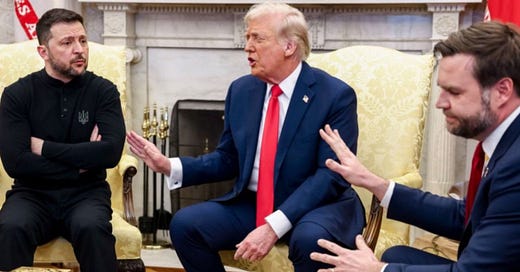Screaming About 'The Globalists' Usually Just Misses the Bigger Picture
In the world of online political discourse, there’s a growing tendency to dismiss any conversation about America’s role abroad as part of some grand “globalist” agenda. It’s an argument I’ve seen thrown around increasingly, especially when it comes to issues like Ukraine, NATO, and broader U.S. foreign policy.
But reducing everything to “globalism” is a lazy excuse for ignoring real national security threats—threats that require America to remain engaged on the world stage.
The Overuse of “Globalist” as a Catch-All Boogeyman
Recently, after I pointed out that neither Donald Trump nor Volodymyr Zelenskyy looked great in their recent public exchange, I received several responses accusing me of not understanding that Zelenskyy is a “tool of the globalists.”
That phrase stuck with me—not because it was a profound insight, but because it perfectly represents a flawed mindset that has taken hold in parts of the populist right.
The term “globalist” has become a catch-all label—just like “neoconservative” was for years—that people throw around without defining, without thinking through its meaning, and without considering the actual implications of America disengaging from world affairs.
It’s a convenient way to otherize anyone who believes that America has a vested interest in what happens beyond its borders. If you care about international threats, support foreign alliances, or believe in the strategic value of partnerships abroad, you must be a “globalist.”
But here’s the truth: Being pro-America doesn’t mean pretending the rest of the world doesn’t exist.
America’s Interests Don’t Stop at the Border
The idea that America should only focus inward completely ignores a fundamental truth—the world doesn’t stop turning just because we’d rather not pay attention.
The war in Ukraine isn’t just about Ukraine. It’s about how a hostile Russia is reshaping global security. The situation in Taiwan isn’t just about Taiwan. It’s about China’s ambitions to expand its influence and challenge U.S. power in the Pacific.
To pretend that these aren’t America’s problems is to fundamentally misunderstand how global stability works.
We’ve seen what happens when the U.S. retreats from the world stage: Our adversaries become bolder, conflicts escalate, and instability spreads. The Obama administration’s passivity in Syria and Ukraine, the Biden administration’s disastrous Afghanistan withdrawal, and Europe’s dependence on America for military support all highlight what happens when the U.S. fails to take leadership seriously.
The Trump administration, for all the controversy it generated, actually understood this better than most. The Abraham Accords, the killing of Iranian General Qasem Soleimani, and the diplomatic pressure on NATO allies to meet their defense obligations were examples of how a strong America makes the world more stable—not the other way around.
The Difference Between Caution and Isolationism
Now, does this mean we should blindly support every international conflict or write blank checks to every country that asks for help? Of course not.
Skepticism of foreign aid, military intervention, and global alliances is healthy—but outright dismissing America’s role in the world as “globalism” is reckless.
The smart move is not retreating from the world stage—it’s ensuring that our involvement serves American interests first. That means:
Holding our allies accountable while maintaining strategic partnerships.
Demanding transparency on foreign aid—where it goes and how it’s used.
Projecting strength so adversaries like China, Russia, and Iran don’t feel emboldened.
But simply shrugging off foreign policy as a “globalist” game and pretending that America can just ignore the world and hope for the best? That’s not strength—it’s short-sighted wishful thinking.
A Strong America Leads, Not Retreats
If there’s one lesson history has taught us, it’s that a world without American leadership quickly becomes more dangerous.
Isolationism didn’t work before World War II, and it won’t work now. The moment America stops engaging globally, Russia, China, and Iran step in to fill the void.
So instead of screaming about "globalists” dragging America into unnecessary wars, maybe the focus should be on what actually keeps America secure—an engaged, strategic, and unapologetically strong foreign policy.
Because at the end of the day, being pro-America means securing our interests—both at home and abroad.



